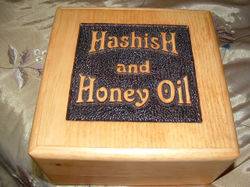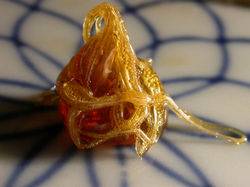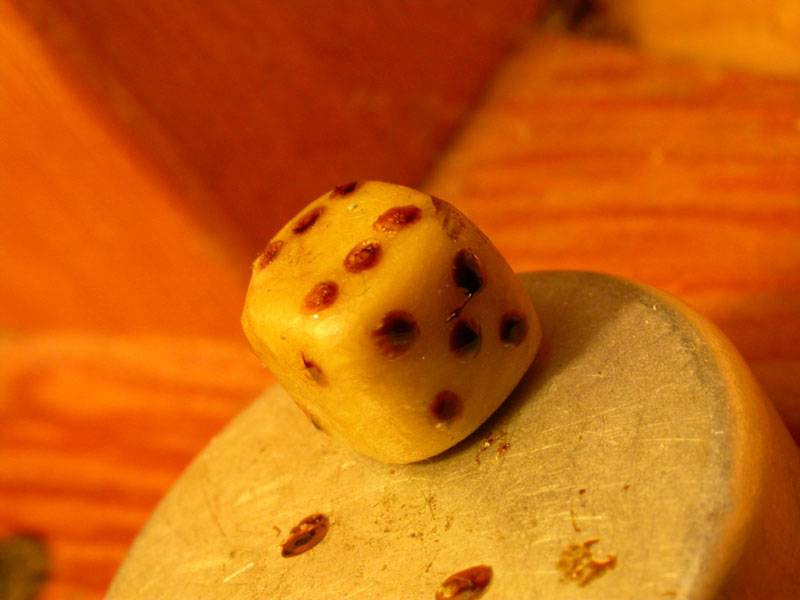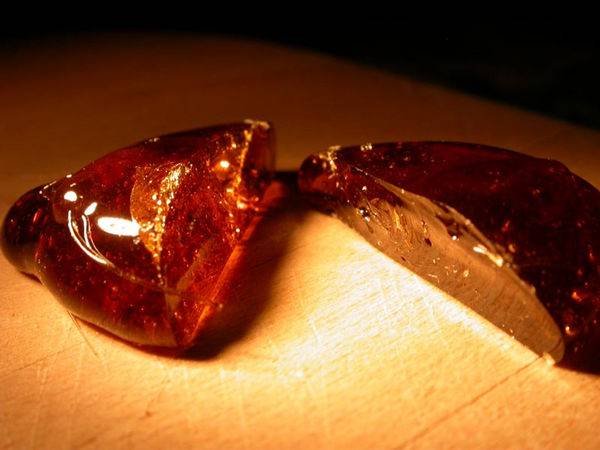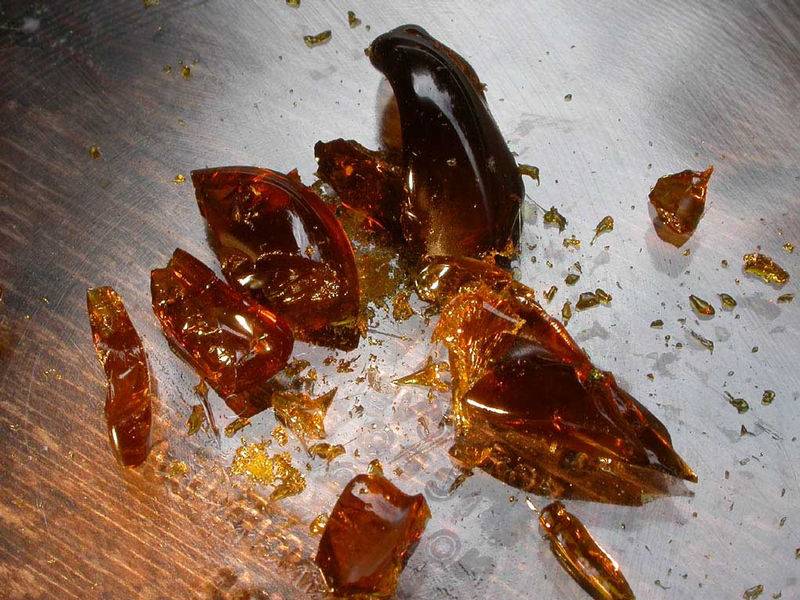This forum is in serious needs of some How-to's. If this has already been covered, excuse the redundancy. If you are here to bash the safety or consumption of honey oil, MOVE TO THE NEXT THREAD!
Disclaimer
Butane Honey Oil (BHO) extraction is an extremely dangerous activity. Butane is flammable, explosive and can potentially contain poisonous and harmful chemicals. Undertaking BHO extraction may result in serious bodily injury, or Death if proper precautions are not taken. The information provided on this website is strictly for educational purposes and in no way do the owners and staff of IC.mag encourage its production or use.
Butane is Highly Flammable and ALL extractions are to be done Outdoors Only, doing extractions indoors is extremely dangerous. There have been accounts of people blowing up their houses, kitchens, bathrooms doing Butane and other solvent extractions indoors.
Butane gas is heavier than air and will pool in low areas, if left to collect butane gas becomes flammable when it reaches 1.8% to 8.5% concentration in air. A small breeze will keep the butane from being able to pool and become dangerous.
It is recommended you take every precaution possible. Wearing Safety Equipment such as Eye protection, as well as gloves and always keep a fire extinguisher near by.
Butane and your health
Some brands of butane add a smell to their butane. This smell is usually added to the butane so that humans can detect leaks, you will find it in large amounts in cheap butane, or camping butane. It can also potentially be in “Clean” butane such as Colibri but i have never seen it. A prime example of smelly butane is Ronson brand
These chemicals are usually Mercaptans or Sulfur Dioxide (Rotten Egg Smell), using cheap butane with high levels of these is harmful, Do not use cheap butane or camping butane.
It is not known what the effects of residues in butane honey oil are; it’s not even known for sure what if any residues are left over in butane honey oil after the butane is purged.
Only a GC/MS (Gas Chromatography/Mass Spectrometer) can give us the info on what’s exactly is in our BHO. The search is on to find somewhere to get a sample tested.
Until Then, be aware of the potential health risks and judge for yourself if it’s worth it.
Not all butane is created equally; there are 2 different types of butane that make up the most common brands of butane. Isobutane and N-Butane.
Most cheap brands use Isobutane (2-METHYL PROPANE) and is more toxic and hazardous than N-Butane. For making Honey oil N-Butane is what we want, it extracts better and leaves very little to no residues in the oil.
Other brands use a mix of the different types, and some, like Colibri, use propane as well as Iso and n-butane
Boiling Points
ISOBUTANE: -11.7 C
N-BUTANE: -0.5 C
No source of pure N-Butane has been found available in stores, only through Gas Supply Companies. The best brand of butane I have used is Colibri Butane. I highly recommend Colibri, and you should be able to find it at most Fine Cigar and Tobacco Shoppe’s. Below is a list of other brands that are good for making Honey oil with. If you cannot find Colibri try to find one of the butane brands listed. And by all means avoid Ronson, Bernz-o-matic or other butane not listed below, they add smell to their butane and this smell is left behind making the oil taste very bad.
Other Brands that are good to use: COLIBRI, NEWPORT, CORA, CTC, COLTON, DUNHILL, DAVIDOFF, FACKELMAN, WIN, NIBO, SAROME, CALOR GAS MATCH, UNILIGHT, K2, SUPERGAS, VENTTI, VECTOR, King butane, Lucienne and Blaster. However this in no way is a complete list.
Places to get good butane online
http://kingbutane.com
Ebay
Blazer butane
When you purchase the butane make sure you find the largest size of can you can. I use the 300ml/167g (6oz) cans of Colibri. Most places only carry the little 2oz cans, these are not enough. You will need at least 8oz of butane for every 1oz of plant material.
If you find a brand that’s not listed you can do the mirror test to check to see if it’s ok to use. Spray butane on a clean mirror and let it evaporate. See Below.
Clean mirror

sprayed butane
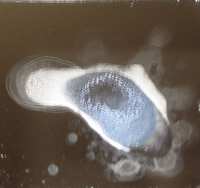
Butane after evaporation......not good!
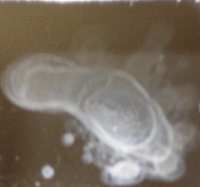
Plant Material
This is the most important factor if you wish to achieve high quality honey oil, Good fresh dried uncrushed bud makes the best honey oil, and you should easily achieve clear oil using uncrushed buds. Grind them up and do a second extraction to get a lower grade “B” wash, not as tasty or clear like the first batch.
Butane extracts the smell from the plant material, so if you have some great smelling buds the oil will also take on that smell. If you use bad smelling or tasting plant material, you will get bad tasting oil.
Using crappy plant material can also result in low yield a, remember "what you put it is what you get out".
The extraction tube
This might be the more difficult but essential piece of equipment to obtain. I personally use the okief x-tractor tube which is stainless and free standing. If you are the DIY type BY ALL MEANS you can always make your own. The extraction tube should be no wider than 1.5”, I find 7/8-1" to be the best. The tube should be made of Stainless steel or Thick glass Only, You can use a copper tube if you cannot find stainless or glass, but only if you clean the tube well before each extraction. Copper tarnishes and the tarnish can potentially be extracted by the butane, it also has that nasty copper smell which can be carried to your oil. You can also use aluminum but that would occasionally need to be cleaned as it oxidizes in high humidity.
Avoid ALL Plastics, brass, steel and galvanized steel pipe, these all can contaminate your oil and make you sick.
Phife uses a cheap stainless steel turkey baster which works very well with little modification and is OK for small amounts.
The extraction
Make sure your plant material (Leaves, Trim, Stems, or Buds) is very dry, the dryer the better. If you want clear honey oil with a lower yield, pack the tube without grinding or breaking up the plant material. If you use whole nugs that are very dense, it's best to brek them up a little to allow more exposed trichomes. The butane will extract the high quality oil on the outside of the plant material then unpack the tube, Grind up the plant material lightly and definitely not a powder for a lower grade oil.
The better the starting material the better the oil. If you use males or just fan leaves don’t expect awesome oil or mush oil at all. You can also use butane extraction to salvage moldy buds.
Fill the extraction tube full with the powdered plant material; avoid making air pockets in the tube. I like to fill the tube a little then lightly push it down till i feel slight resistance and repeat until the tube is full.Never pack the tube like you would a cannon, this causes dense spots that make it difficult for the butane to pass, causing back pressure and possibly a blowout = a face full of tane.
Don’t pack it to much and try to make sure the tube is full, if you don’t have enough plant material to fill your tube then try to get a smaller tube. Air pockets let the liquid butane expand to gas and lower the efficiency a little. After your tube is filled then you can place your screen on the bottom, . The picture shows a steel mesh screen on an okief tube Find some way to mount the tube on a stand or get an oven mitt as the tube gets very cold, and you won’t be able to hold it with your bare hand for very long.
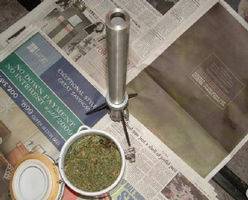
Before i go OUTSIDE, i place a large pan of water on the stove and turn the burner on high. You want the pan of water Hot BUT NOT BOILING
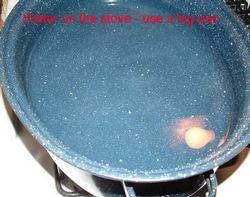
You will want to use a pyrex dish that will easily fit inside your pan of water. Be sure the dish is atleast 1.5" deep. Next take all your stuff outside.
I place the tube in the pan and begin injecting butane, i do this for 30 seconds, stop and wait 15 seconds and continue till the can is empty. You will know the can is empty when you hear a slight pitch in sound coming from the can. For this run i used 2 6oz cans per tube.(you will see some already dark areas in the pan, that was some left over from a previous run)
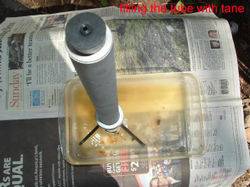
Once you have finished let the tube sit till it stops dripping. Go get your pan of hot water and TAKE IT OUTSIDE to purge the butane from your oil. Besure your water is not BOILING. This will cause a violent reaction when the freezing butane meets boiling water and go everywhere.
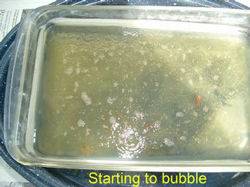
It really starts going after about 15 seconds
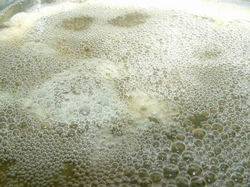
Getting close to done
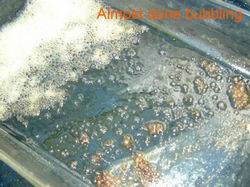
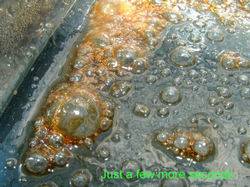
Done with this portion. Notice the cloudy bubbles - trapped butane. At this point i pop the bubbles and place the dish on a heating pad on high for one hour, to insure all butane is gone.
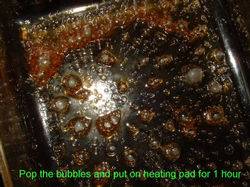
Placed on a heating pad -set on low-for one hour.
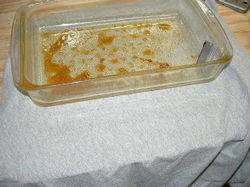
Purged oil
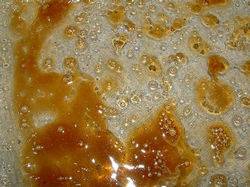
Now for the rewarding part....the scrape
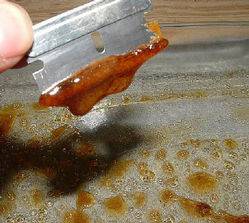
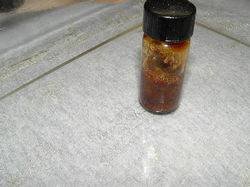
I would also like to point out that foaf has a method to avoid scraping, using a teflon bag.....ingenious: The foaf method
Depending on how well your oil is purged and the quality of material used you can wind up with some very fine hard oil. These sculptures sre entirely of hard honey oil
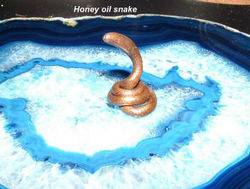
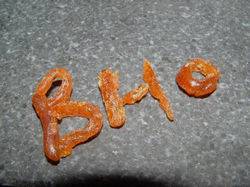
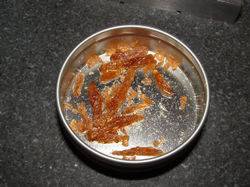
By all means use safety precautions and do everything outside.Be safe and enjoy!
*Credits to Phife and foaf for some of this information*
Disclaimer
Butane Honey Oil (BHO) extraction is an extremely dangerous activity. Butane is flammable, explosive and can potentially contain poisonous and harmful chemicals. Undertaking BHO extraction may result in serious bodily injury, or Death if proper precautions are not taken. The information provided on this website is strictly for educational purposes and in no way do the owners and staff of IC.mag encourage its production or use.
Butane is Highly Flammable and ALL extractions are to be done Outdoors Only, doing extractions indoors is extremely dangerous. There have been accounts of people blowing up their houses, kitchens, bathrooms doing Butane and other solvent extractions indoors.
Butane gas is heavier than air and will pool in low areas, if left to collect butane gas becomes flammable when it reaches 1.8% to 8.5% concentration in air. A small breeze will keep the butane from being able to pool and become dangerous.
It is recommended you take every precaution possible. Wearing Safety Equipment such as Eye protection, as well as gloves and always keep a fire extinguisher near by.
Butane and your health
Some brands of butane add a smell to their butane. This smell is usually added to the butane so that humans can detect leaks, you will find it in large amounts in cheap butane, or camping butane. It can also potentially be in “Clean” butane such as Colibri but i have never seen it. A prime example of smelly butane is Ronson brand
These chemicals are usually Mercaptans or Sulfur Dioxide (Rotten Egg Smell), using cheap butane with high levels of these is harmful, Do not use cheap butane or camping butane.
It is not known what the effects of residues in butane honey oil are; it’s not even known for sure what if any residues are left over in butane honey oil after the butane is purged.
Only a GC/MS (Gas Chromatography/Mass Spectrometer) can give us the info on what’s exactly is in our BHO. The search is on to find somewhere to get a sample tested.
Until Then, be aware of the potential health risks and judge for yourself if it’s worth it.
Not all butane is created equally; there are 2 different types of butane that make up the most common brands of butane. Isobutane and N-Butane.
Most cheap brands use Isobutane (2-METHYL PROPANE) and is more toxic and hazardous than N-Butane. For making Honey oil N-Butane is what we want, it extracts better and leaves very little to no residues in the oil.
Other brands use a mix of the different types, and some, like Colibri, use propane as well as Iso and n-butane
Boiling Points
ISOBUTANE: -11.7 C
N-BUTANE: -0.5 C
No source of pure N-Butane has been found available in stores, only through Gas Supply Companies. The best brand of butane I have used is Colibri Butane. I highly recommend Colibri, and you should be able to find it at most Fine Cigar and Tobacco Shoppe’s. Below is a list of other brands that are good for making Honey oil with. If you cannot find Colibri try to find one of the butane brands listed. And by all means avoid Ronson, Bernz-o-matic or other butane not listed below, they add smell to their butane and this smell is left behind making the oil taste very bad.
Other Brands that are good to use: COLIBRI, NEWPORT, CORA, CTC, COLTON, DUNHILL, DAVIDOFF, FACKELMAN, WIN, NIBO, SAROME, CALOR GAS MATCH, UNILIGHT, K2, SUPERGAS, VENTTI, VECTOR, King butane, Lucienne and Blaster. However this in no way is a complete list.
Places to get good butane online
http://kingbutane.com
Ebay
Blazer butane
When you purchase the butane make sure you find the largest size of can you can. I use the 300ml/167g (6oz) cans of Colibri. Most places only carry the little 2oz cans, these are not enough. You will need at least 8oz of butane for every 1oz of plant material.
If you find a brand that’s not listed you can do the mirror test to check to see if it’s ok to use. Spray butane on a clean mirror and let it evaporate. See Below.
Clean mirror

sprayed butane

Butane after evaporation......not good!

Plant Material
This is the most important factor if you wish to achieve high quality honey oil, Good fresh dried uncrushed bud makes the best honey oil, and you should easily achieve clear oil using uncrushed buds. Grind them up and do a second extraction to get a lower grade “B” wash, not as tasty or clear like the first batch.
Butane extracts the smell from the plant material, so if you have some great smelling buds the oil will also take on that smell. If you use bad smelling or tasting plant material, you will get bad tasting oil.
Using crappy plant material can also result in low yield a, remember "what you put it is what you get out".
- 1oz high quality 12oz butane needed 3-6g expected yield
- 1oz average 10oz butane 2-4g yield
- 1oz low grade(schwag) 9oz butane 2-3g yield
- 1oz high quality trim 12oz butane 3-5g
- 1oz trim and leaves 10oz butane 2-5g
- 1oz fan leaves 8oz butane 1-2g
The extraction tube
This might be the more difficult but essential piece of equipment to obtain. I personally use the okief x-tractor tube which is stainless and free standing. If you are the DIY type BY ALL MEANS you can always make your own. The extraction tube should be no wider than 1.5”, I find 7/8-1" to be the best. The tube should be made of Stainless steel or Thick glass Only, You can use a copper tube if you cannot find stainless or glass, but only if you clean the tube well before each extraction. Copper tarnishes and the tarnish can potentially be extracted by the butane, it also has that nasty copper smell which can be carried to your oil. You can also use aluminum but that would occasionally need to be cleaned as it oxidizes in high humidity.
Avoid ALL Plastics, brass, steel and galvanized steel pipe, these all can contaminate your oil and make you sick.
Phife uses a cheap stainless steel turkey baster which works very well with little modification and is OK for small amounts.
The extraction
Make sure your plant material (Leaves, Trim, Stems, or Buds) is very dry, the dryer the better. If you want clear honey oil with a lower yield, pack the tube without grinding or breaking up the plant material. If you use whole nugs that are very dense, it's best to brek them up a little to allow more exposed trichomes. The butane will extract the high quality oil on the outside of the plant material then unpack the tube, Grind up the plant material lightly and definitely not a powder for a lower grade oil.
The better the starting material the better the oil. If you use males or just fan leaves don’t expect awesome oil or mush oil at all. You can also use butane extraction to salvage moldy buds.
Fill the extraction tube full with the powdered plant material; avoid making air pockets in the tube. I like to fill the tube a little then lightly push it down till i feel slight resistance and repeat until the tube is full.Never pack the tube like you would a cannon, this causes dense spots that make it difficult for the butane to pass, causing back pressure and possibly a blowout = a face full of tane.
Don’t pack it to much and try to make sure the tube is full, if you don’t have enough plant material to fill your tube then try to get a smaller tube. Air pockets let the liquid butane expand to gas and lower the efficiency a little. After your tube is filled then you can place your screen on the bottom, . The picture shows a steel mesh screen on an okief tube Find some way to mount the tube on a stand or get an oven mitt as the tube gets very cold, and you won’t be able to hold it with your bare hand for very long.

Before i go OUTSIDE, i place a large pan of water on the stove and turn the burner on high. You want the pan of water Hot BUT NOT BOILING

You will want to use a pyrex dish that will easily fit inside your pan of water. Be sure the dish is atleast 1.5" deep. Next take all your stuff outside.
I place the tube in the pan and begin injecting butane, i do this for 30 seconds, stop and wait 15 seconds and continue till the can is empty. You will know the can is empty when you hear a slight pitch in sound coming from the can. For this run i used 2 6oz cans per tube.(you will see some already dark areas in the pan, that was some left over from a previous run)

Once you have finished let the tube sit till it stops dripping. Go get your pan of hot water and TAKE IT OUTSIDE to purge the butane from your oil. Besure your water is not BOILING. This will cause a violent reaction when the freezing butane meets boiling water and go everywhere.

It really starts going after about 15 seconds

Getting close to done


Done with this portion. Notice the cloudy bubbles - trapped butane. At this point i pop the bubbles and place the dish on a heating pad on high for one hour, to insure all butane is gone.

Placed on a heating pad -set on low-for one hour.

Purged oil

Now for the rewarding part....the scrape


I would also like to point out that foaf has a method to avoid scraping, using a teflon bag.....ingenious: The foaf method
Depending on how well your oil is purged and the quality of material used you can wind up with some very fine hard oil. These sculptures sre entirely of hard honey oil



By all means use safety precautions and do everything outside.Be safe and enjoy!
*Credits to Phife and foaf for some of this information*
Last edited:

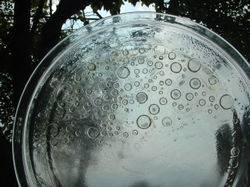
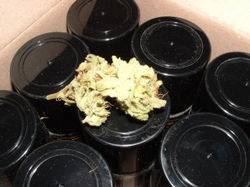
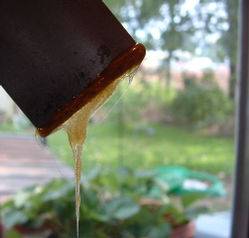
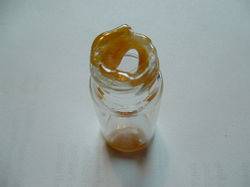
 But that was some seriously frosty bud, the stems were also covered in triches.
But that was some seriously frosty bud, the stems were also covered in triches.
